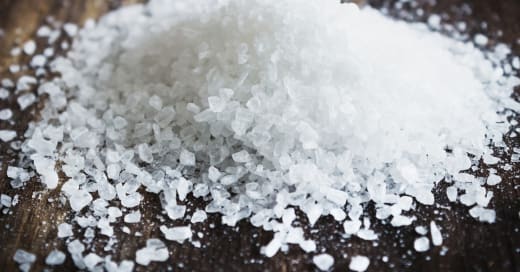Last week, the FDA release new guidance on sodium for the food industry with the goal of bringing down Americans’ daily intake of sodium.
The FDA proposes to reduce our sodium consumption by targeting the food industry - this guidance isn’t for individual people, it’s a suggestion to food companies about how to make their products. There’s nothing mandated, this isn’t a new law, and no one has to listen.
The goal is to get the average American’s sodium consumption down from 3400mg to 3000mg daily, a decrease of around 12%.
This process is a fascinating window into just how screwed up our dietary public health recommendations have become.
I don’t mean to suggest that I think this is a bad recommendation - it’s not. In fact, I believe that if the food industry follows this guidance, the reduction in sodium in packaged food will have a positive public health impact.
But the fact that this is the nature of the conversation shows just how many of our societal conversations around diet exist in a bizarro world.
Cutting down on sodium consumption is controversial
I’ve written about this before - the “science” isn’t actually all that clear when it comes to the relationship between sodium consumption and our health outcomes.
The debate on sodium boils down to the fact that even though every major public health organization recommends reducing sodium consumption, there isn’t actually high quality scientific data to suggest that just lowering sodium is beneficial, even in the sickest patients.
And there’s some evidence that links higher sodium consumption to higher life expectancy, although you need to take all of this research with - pun intended - a grain of salt.
So we’re starting out from a place where some experts question whether dietary sodium reduction is worth the effort.
We know that impact of diet on blood pressure is about much more than sodium intake - we can look at the DASH study to prove it. This study found that a difference in blood pressure levels related to overall dietary patterns when sodium intake remained relatively constant.
A framework for thinking about the salt you consume
When I think about salt in the diet, I use two internal frameworks to consider the health impact.
The first framework is sodium concentration.
When we consume a high concentration of sodium, our blood pressure tends to go up. But that increase in blood pressure is mitigated if we consume water with the salt so as to lower the effective concentration of sodium that we’re getting.
If you’re going to have something with a lot of sodium, when it comes to the blood pressure impact, it may matter whether you have it with a glass of water.
The second framework is balanced versus unbalanced sodium consumption.
Unbalanced means sodium alone without other nutrients - think most high sodium processed foods. Balanced means that the sodium comes in a setting where there are a lot of other minerals, like potassium and magnesium. We know that the consumption of these other electrolytes has a major impact on blood pressure.
Don’t sleep on the impact of dietary potassium here.
The SSaSS trial showed a reduction in stroke risk by giving people a salt substitute that was 75% table salt with 25% potassium chloride mixed in.
In fact, the research consistently shows that higher dietary potassium intake usually leads to lower blood pressure.
Processed foods are where we get the majority of our sodium
By some estimates, around 70% of our total sodium intake comes from packaged foods.
When you cook at home, there’s almost no way that you’re including as much sodium as you’d get from the products that you buy at the store - even if you heavily salt your food.
This gets to the heart of why I think this recommendation is reasonable - lowering the sodium in processed food may help with both of the sodium frameworks I discussed above.
In fact, I think that food manufacturers cutting down on sodium actually has the potential to have a huge public health impact.
But I also think it’s stupid that this is where the discussion is.
This is a smart tactic that advances a bad strategy
Strategy is the overarching goal of what you’re trying to achieve and tactics are the way that you get there.
While reducing sodium in processed foods is probably a good thing overall, this type of healthwashing further entrenches a food system that is slowly poisoning most Americans.
Just think about all of the marketing that you’ll see about “reduced sodium” this or “now with 15% less sodium” that. This type of marketing is honest about the facts but dishonest about the message, and it makes us fat and sick.
Most of what I do in my job is to manage the individual impact of a food system that keeps Americans in a hypercaloric but undernourished state.
The partnership with public health organizations and industry just further solidifies a system that’s slowly destroying the health of a majority of Americans.
So while I am on board with this individual guideline - I think it’s good to reduce sodium in processed food - the end result of a “partnership” between the FDA and the food industry suggests a change in sodium contents without a change in health trajectories.
Thank you for reading! Please share on social media and encourage your friends and family to subscribe!




